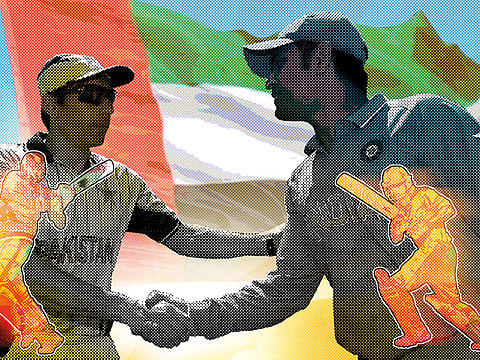UAE’s soft power brings nations together
India-Pakistan cricket matches highlight the country’s historic role in sports diplomacy

Over the past few years, the UAE’s multitude of diplomatic initiatives have included cultural diplomacy — such as an exhibition of Emirati art that toured nine US cities over two years and was titled Past Forward. This was in addition to major artistic events the UAE hosts including the Sharjah Biennial, Art Dubai and Abu Dhabi Art that bring thousands of people together.
We also know about the generous financial aid packages and donations given by the UAE to countries near and far, a tally released by the government last year found that this number has reached a staggering Dh173 billion, and that does not include charity by citizens and residents. Other soft diplomacy initiatives the UAE hosts include numerous meetings between various religious leaders to promote peace.
However, very few of us know about the UAE’s historic role in sports diplomacy.
At a recent gathering I was invited to, His Highness Shaikh Mohammad Bin Zayed Al Nahyan, Crown Prince of Abu Dhabi and Deputy Supreme Commander of the UAE Armed Forces, shared a story with us. He spoke of a western diplomat who paid him a visit some time back. The diplomat told the Crown Prince how much he admired the UAE for its ability to host a certain historic sports competition in the game of cricket. The reason wasn’t immediately clear to the Crown Prince who asked his guest to elaborate.
Here is the background. From the mid-1960s and throughout the 1970s no cricket game was played between India and Pakistan, two of the world’s greatest cricketing nations. Relations between the two countries that split from each other in 1947 were so tense that they reached breaking point in 1965 and again in 1971 when two wars erupted. It was only in the early 1980s when a Sharjah businessman called Abdul Rahman Bukhatir decided to build a cricket stadium and after almost two tumultuous decades of rupture that the first cricket game between India and Pakistan was played here in the UAE.
Bukhatir — an Emirati businessman, who together with my late father, moved to the Indian subcontinent prior to partition developing an affinity with the region, mastering the dominant language — identified this golden opportunity and decided to take a leap of faith.
According to my research he reached out to British architecture firm Peter Hudson Buckle & Partners and funded the construction of the Sharjah Cricket Stadium from his own pocket.
The project was completed in 1982 and in the 35 years since its opening, has gone to hold the record for hosting the maximum number of One-day Internationals in world cricket, according to K.R. Nayar, Gulf News’ chief cricket writer.
Game’s symbolism
The visiting dignitary explained that this game was symbolic in many ways. It signalled a new chapter for India and Pakistan relations, one that was no longer constrained to the realm of military force and diplomatic escalation.
He told Shaikh Mohammad: “Your country has accomplished something that no other state would have been able to, including my own country. You have managed to become a neutral territory that is acceptable to both sides in this diplomatically sensitive feud.” The visitor added, “The UAE succeeded because of its goodwill and the trust both sides had in it.”
Shaikh Mohammad Bin Zayed was so touched by this story that he chose to share it with a gathering of UAE writers and intellectuals in order to impress upon them the legacy of our spirit of openness that he would like us to carry forth.
The historic first game was also acknowledgement of the role that the UAE, then barely a decade old, would play in bringing people of various backgrounds together. The series of games that were played in that venue were so successful that Indians and Pakistanis stood side-by-side in the stadiums and on the rooftops of adjacent buildings, some with binoculars to catch a glimpse of these historic matches.
There are, however, countless other examples — some of which even we as citizens aren’t aware of — where the UAE has played an instrumental role in lessening tensions in the region, bringing scores of nationalities together and replacing despair with hope.
In 1971, when the founding fathers of the UAE, all of whom have since passed on, declared the formation of the union, they could not possibly have had an idea about just how successful the UAE would be as a country.
The UAE is the only federation and, hands down, the most successful country in the Arab world. This once fledgling and fragile country surrounded by bigger neighbours has today become a force to be reckoned with — not merely in terms of military might but in terms of intellectual, academic, cultural and most importantly humanitarian ideals.
The true wealth of this nine-million strong nation is not in its massive oil reserves or its giant sovereign wealth fund.
The true wealth of the UAE is the people, both citizens and foreigners, who have come together to build a nation and turn it into an oasis of tolerance, respect and opportunity for all.
Sultan Sooud Al Qassemi is a UAE-based writer. You can follow him on Twitter on @sultanalqassemi.
Sign up for the Daily Briefing
Get the latest news and updates straight to your inbox


